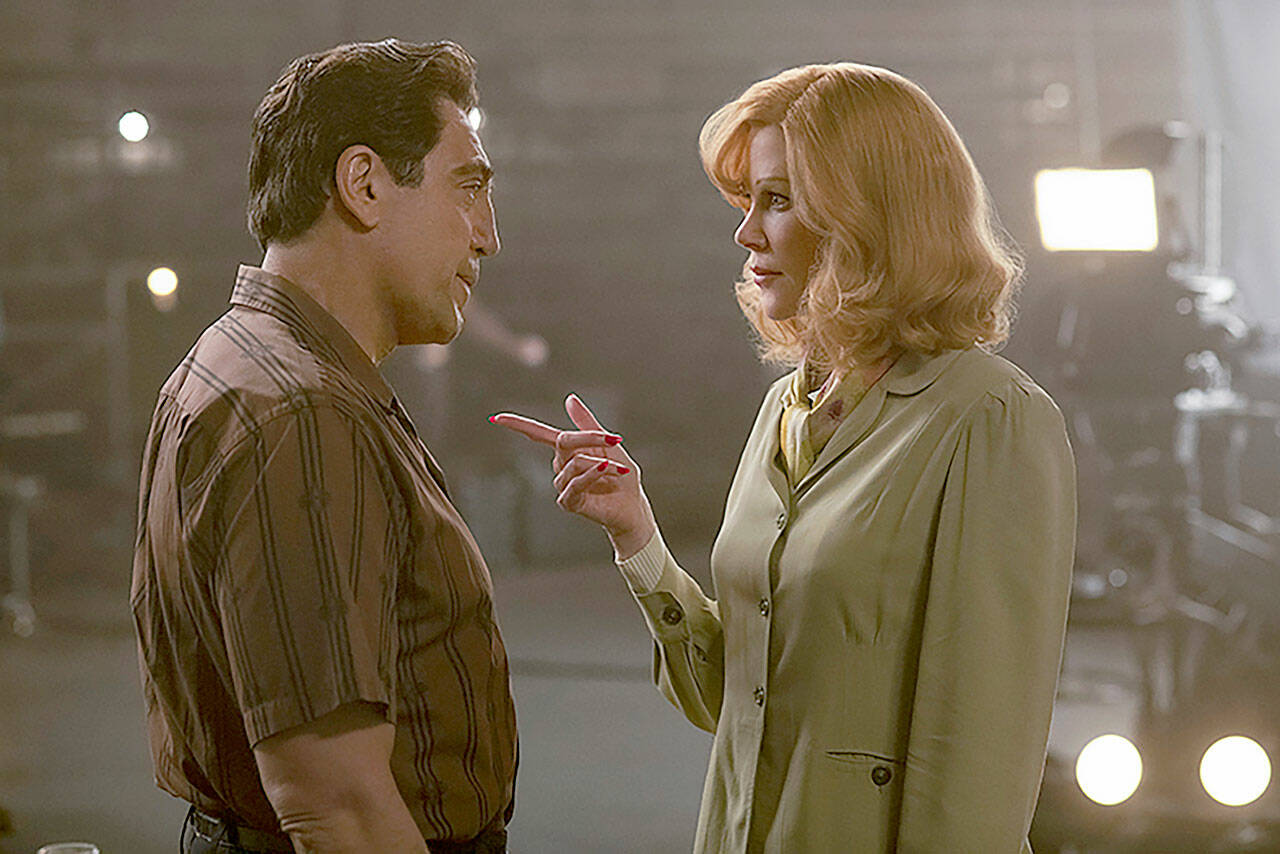By Katie Walsh / Tribune News Service
Aaron Sorkin’s “Being the Ricardos” opens with confusion and ends with a fizzle, two appropriate bookends for this messy biopic about Lucille Ball that never lands on exactly what it is that it wants to say about the legendary TV woman, and her famous TV marriage. Folks have already looked askance at star Nicole Kidman in a mask of frozen-looking makeup, playing the famously expressive Lucy, and at Javier Bardem taking on the role of the sleek Cuban bandleader Desi Arnaz, but the acting is not the problem, not by a long shot. In fact, the actors are the best part of this otherwise poorly executed film, which actively works against whatever insights it may have wanted to impart about Lucy, Desi and their influential TV show.
The film opens Friday at the Alderwood Mall, Crest and Seattle 10 theaters. It will begin streaming on Amazon Prime on Dec. 21. It’s rated R for language.
“Being the Ricardos” is nestled within a baffling, and entirely superfluous, framing device: a fake documentary with actors playing the writers and producers of “I Love Lucy,” 50 or so years down the line, commenting on the Most Dramatic Week of the Show Ever. This week on the smash hit “I Love Lucy,” Lucy is accused of being a Communist by Walter Winchell, Desi’s partying has landed him in the tabloids, and Lucy finds out she’s pregnant. Whatever will CBS and Phillip Morris do? More importantly, what will Lucy and Desi do?
The challenges presented during this week of rehearsal and filming serve as the opportunity to flash back to Lucy and Desi’s courtship and newlywed days, painting them as ambitious artistic equals. The acerbic Lucille confidently seduces Desi on the set of “Too Many Girls,” and on their first date she informs him that all she wants is a “home.”
Turns out the only place they can find said home is on a TV set, because the only way these two married workaholics will spend time together is if they have the same job, which Lucy astutely realizes when she’s offered her own domestic sitcom after flaming out at RKO and finding success in radio dramas. However, their marriage is perfect only within the confines of “I Love Lucy,” so Ball, a comedic genius, grinds her crew to make the show perfect, because when the show is perfect, her marriage is perfect.
When the film is focused on the complexities of this relationship between two wildly talented and driven people, it works, but Sorkin uses Lucille Ball merely as a vessel for unpacking the finer nuances of early TV comedy, and discussing Sen. Joseph McCarthy’s House Un-American Activities Committee and the dangers of the Hollywood Blacklist.
The dialogue does indeed snap and crackle, but the script’s overly fussy and navel-gazing structure flops. Plus, the climatic stakes are a joke. Anyone with even a passing knowledge of American pop culture is familiar with the legacy of “I Love Lucy,” ergo, we never wonder if that is in jeopardy. Even worse, every time it positions Ball as a comedic genius and a shrewd businesswoman who pushed the boundaries of American culture through her art, it undermines her, reminding us that she’s also a jealous nag, constantly questioning Desi’s fidelity, even in her most victorious moments. It’s true that she can be (and was) both of those things, but the film returns, again and again, to this, rather diminishing, if not sexist, conclusion, leaving one with a queasy feeling.
Also contributing to the queasiness is the film’s visual aesthetic, a dim, dark and drab affair that looks like it’s been processed through a “mud puddle” filter. Perhaps the intent was a nostalgic sepia-toned, smoke-filled room sort of look, but the result is just plain ugly. Sorkin has figured out how to move the camera every now and again, but the film’s color palette is so profoundly bleak, it’s depressing, contributing to the overall downer effect of “Being the Ricardos,” a film that doesn’t even seem to love Lucy all that much.
Talk to us
> Give us your news tips.
> Send us a letter to the editor.
> More Herald contact information.

























